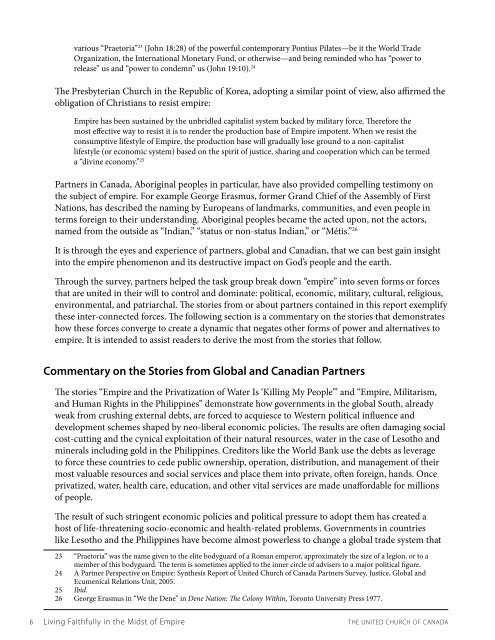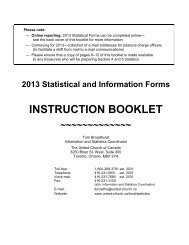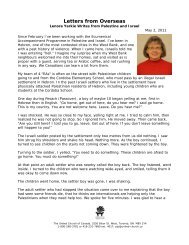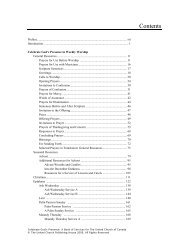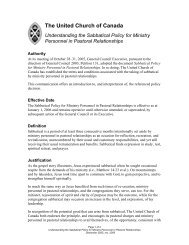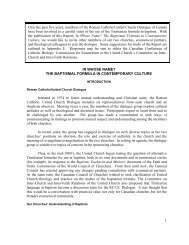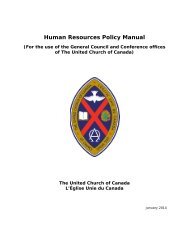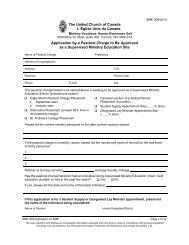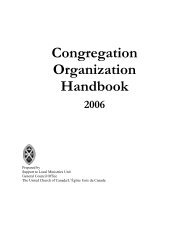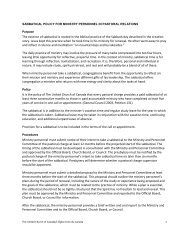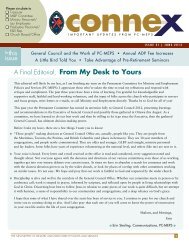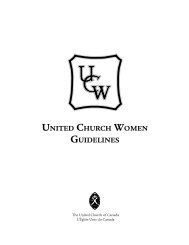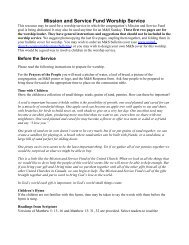Living Faithfully in the Midst of Empire - The United Church of Canada
Living Faithfully in the Midst of Empire - The United Church of Canada
Living Faithfully in the Midst of Empire - The United Church of Canada
You also want an ePaper? Increase the reach of your titles
YUMPU automatically turns print PDFs into web optimized ePapers that Google loves.
various “Praetoria” 23 (John 18:28) <strong>of</strong> <strong>the</strong> powerful contemporary Pontius Pilates—be it <strong>the</strong> World Trade<br />
Organization, <strong>the</strong> International Monetary Fund, or o<strong>the</strong>rwise—and be<strong>in</strong>g rem<strong>in</strong>ded who has “power to<br />
release” us and “power to condemn” us (John 19:10). 24<br />
<strong>The</strong> Presbyterian <strong>Church</strong> <strong>in</strong> <strong>the</strong> Republic <strong>of</strong> Korea, adopt<strong>in</strong>g a similar po<strong>in</strong>t <strong>of</strong> view, also affirmed <strong>the</strong><br />
obligation <strong>of</strong> Christians to resist empire:<br />
<strong>Empire</strong> has been susta<strong>in</strong>ed by <strong>the</strong> unbridled capitalist system backed by military force. <strong>The</strong>refore <strong>the</strong><br />
most effective way to resist it is to render <strong>the</strong> production base <strong>of</strong> <strong>Empire</strong> impotent. When we resist <strong>the</strong><br />
consumptive lifestyle <strong>of</strong> <strong>Empire</strong>, <strong>the</strong> production base will gradually lose ground to a non-capitalist<br />
lifestyle (or economic system) based on <strong>the</strong> spirit <strong>of</strong> justice, shar<strong>in</strong>g and cooperation which can be termed<br />
a “div<strong>in</strong>e economy.” 25<br />
Partners <strong>in</strong> <strong>Canada</strong>, Aborig<strong>in</strong>al peoples <strong>in</strong> particular, have also provided compell<strong>in</strong>g testimony on<br />
<strong>the</strong> subject <strong>of</strong> empire. For example George Erasmus, former Grand Chief <strong>of</strong> <strong>the</strong> Assembly <strong>of</strong> First<br />
Nations, has described <strong>the</strong> nam<strong>in</strong>g by Europeans <strong>of</strong> landmarks, communities, and even people <strong>in</strong><br />
terms foreign to <strong>the</strong>ir understand<strong>in</strong>g. Aborig<strong>in</strong>al peoples became <strong>the</strong> acted upon, not <strong>the</strong> actors,<br />
named from <strong>the</strong> outside as “Indian,” “status or non-status Indian,” or “Métis.” 26<br />
It is through <strong>the</strong> eyes and experience <strong>of</strong> partners, global and Canadian, that we can best ga<strong>in</strong> <strong>in</strong>sight<br />
<strong>in</strong>to <strong>the</strong> empire phenomenon and its destructive impact on God’s people and <strong>the</strong> earth.<br />
Through <strong>the</strong> survey, partners helped <strong>the</strong> task group break down “empire” <strong>in</strong>to seven forms or forces<br />
that are united <strong>in</strong> <strong>the</strong>ir will to control and dom<strong>in</strong>ate: political, economic, military, cultural, religious,<br />
environmental, and patriarchal. <strong>The</strong> stories from or about partners conta<strong>in</strong>ed <strong>in</strong> this report exemplify<br />
<strong>the</strong>se <strong>in</strong>ter-connected forces. <strong>The</strong> follow<strong>in</strong>g section is a commentary on <strong>the</strong> stories that demonstrates<br />
how <strong>the</strong>se forces converge to create a dynamic that negates o<strong>the</strong>r forms <strong>of</strong> power and alternatives to<br />
empire. It is <strong>in</strong>tended to assist readers to derive <strong>the</strong> most from <strong>the</strong> stories that follow.<br />
Commentary on <strong>the</strong> Stories from Global and Canadian Partners<br />
<strong>The</strong> stories “<strong>Empire</strong> and <strong>the</strong> Privatization <strong>of</strong> Water Is ‘Kill<strong>in</strong>g My People’” and “<strong>Empire</strong>, Militarism,<br />
and Human Rights <strong>in</strong> <strong>the</strong> Philipp<strong>in</strong>es” demonstrate how governments <strong>in</strong> <strong>the</strong> global South, already<br />
weak from crush<strong>in</strong>g external debts, are forced to acquiesce to Western political <strong>in</strong>fluence and<br />
development schemes shaped by neo-liberal economic policies. <strong>The</strong> results are <strong>of</strong>ten damag<strong>in</strong>g social<br />
cost-cutt<strong>in</strong>g and <strong>the</strong> cynical exploitation <strong>of</strong> <strong>the</strong>ir natural resources, water <strong>in</strong> <strong>the</strong> case <strong>of</strong> Lesotho and<br />
m<strong>in</strong>erals <strong>in</strong>clud<strong>in</strong>g gold <strong>in</strong> <strong>the</strong> Philipp<strong>in</strong>es. Creditors like <strong>the</strong> World Bank use <strong>the</strong> debts as leverage<br />
to force <strong>the</strong>se countries to cede public ownership, operation, distribution, and management <strong>of</strong> <strong>the</strong>ir<br />
most valuable resources and social services and place <strong>the</strong>m <strong>in</strong>to private, <strong>of</strong>ten foreign, hands. Once<br />
privatized, water, health care, education, and o<strong>the</strong>r vital services are made unaffordable for millions<br />
<strong>of</strong> people.<br />
<strong>The</strong> result <strong>of</strong> such str<strong>in</strong>gent economic policies and political pressure to adopt <strong>the</strong>m has created a<br />
host <strong>of</strong> life-threaten<strong>in</strong>g socio-economic and health-related problems. Governments <strong>in</strong> countries<br />
like Lesotho and <strong>the</strong> Philipp<strong>in</strong>es have become almost powerless to change a global trade system that<br />
23 “Praetoria” was <strong>the</strong> name given to <strong>the</strong> elite bodyguard <strong>of</strong> a Roman emperor, approximately <strong>the</strong> size <strong>of</strong> a legion, or to a<br />
member <strong>of</strong> this bodyguard. <strong>The</strong> term is sometimes applied to <strong>the</strong> <strong>in</strong>ner circle <strong>of</strong> advisers to a major political figure.<br />
24 A Partner Perspective on <strong>Empire</strong>: Syn<strong>the</strong>sis Report <strong>of</strong> <strong>United</strong> <strong>Church</strong> <strong>of</strong> <strong>Canada</strong> Partners Survey, Justice, Global and<br />
Ecumenical Relations Unit, 2005.<br />
25 Ibid.<br />
26 George Erasmus <strong>in</strong> “We <strong>the</strong> Dene” <strong>in</strong> Dene Nation: <strong>The</strong> Colony With<strong>in</strong>, Toronto University Press 1977.<br />
<strong>Liv<strong>in</strong>g</strong> <strong>Faithfully</strong> <strong>in</strong> <strong>the</strong> <strong>Midst</strong> <strong>of</strong> <strong>Empire</strong> THE UNITED CHURCH OF CANADA


